Subscribe today to receive the next issue of Game Informer, featuring the Most Anticipated Games of 2026!
Demon Slayers: Gaming Tackles Real Issues
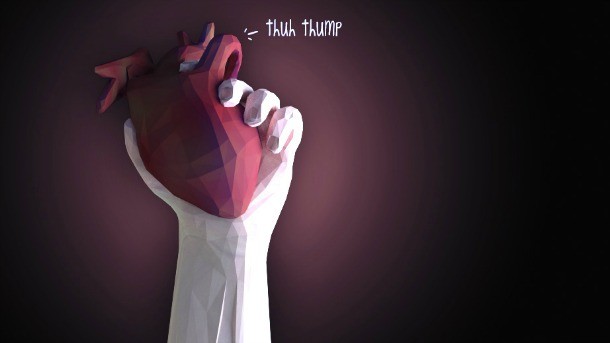
“Don’t judge a man until you have walked a mile in his shoes.”
We say it all the time. In life we all have unique struggles and situations to face. The most evocative movies, books, and music deal with the ups and downs of life. We’re drawn to what’s real and meaningful – something we can relate to or view in a new light. Mostly, we just want to feel understood.
For decades, games have primarily been a tool for escapism. Plenty of people sit down with a game for a reprieve, a fun diversion. But as the nascent industry evolves, so do the experiences that games can offer. Not every game has to be mindless or take you away from real-life issues. More and more developers are using games to convey their personal stories, tackling heavy issues like depression, alcoholism, and cancer to make players experience what it’s like to be put in an unsettling situation.
Last year, Depression Quest, I Get This Call Every Day, and Papers, Please took many people by surprise by casting you in a difficult role, earning this emerging genre the moniker “empathy games.” Developers might not love the label, but it says something about their games. They’re meaningful. They introduce an issue or experience players might not otherwise consider, and the trend is speeding up. This War of Mine, Silent Enemy, Gods Will Be Watching, and That Dragon, Cancer are just a few bold games of this ilk on the horizon.
[This feature originally appeared in Game Informer issue #254]
Challenging The System
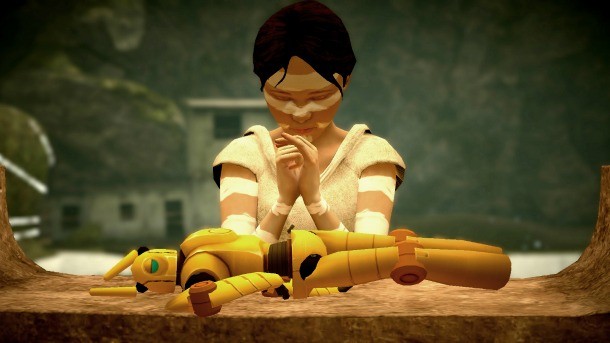
Big publishers don’t like to gamble. Armed with market research, they know what makes money, and anything that strays away from their proven formulas is a hard sell. Vander Caballero knows this firsthand. He worked at EA for eight years on franchises like Army of Two and Need for Speed before breaking off to form his own studio. He learned the skills necessary to create games, but he also learned to conform. “I just wasn’t happy because all the different ideas, all the culture…everything has to fit around teenage power fantasies,” Caballero says. “And the moment that you were stepping out of that you were ‘acting weirdly.’”
Caballero desired fulfillment. He felt blessed to work on video games, but wanted to create something more meaningful and personal, something different, a scary word for any publisher. “Now I don’t feel like I was actually weird, but at the same time, I felt like I was a weirdo,” he says. “I [kept thinking] am I wrong? Is something wrong with me? And [then] I [realized] I’m not wrong. It’s the system that’s wrong.”
Coming to this realization, Caballero left EA and risked forming his own studio, Minority, in 2010. “I wanted to see if I could make it because I was ready to leave the game industry,” he says. With a low budget and the desire to come out on console, Caballero had to think of what type of story to tell, so he looked back at his life as a gamer. “I went to my childhood and I remember playing Mario for hours and hours and that was my escape, but there was this frustration every time I came back to reality because it wasn’t helping,” he says. “I could defeat all the evil guys in Mario and Zelda, but then when I came back to my reality nothing that I learned or experienced helped me in my life. It was a sad return to life every time. Then I [thought], ‘What if I do a game about how to defeat my alcoholic father, but in a meaningful way? For relief.’ It took me many years to defeat my father and it was not through violence. It just clicked in my head that’s what I’m going to do.”
The idea didn’t end Caballero’s troubles though. As he started pitching the prototype, he felt the familiar resistance he did at EA. “Every game producer that I pitched the idea of Papo & Yo, who saw the prototype, was like, ‘No. No. No. You cannot do that. You have to change this. You have to change that,’” Caballero says. “Again, I started feeling weird. Then I [thought] this is wrong. It should not be that way.”
Caballero eventually got a call from Cath erine Bainbridge, who had a background in documentary and fiction programming and was looking to get involved with video games.
For the first time, Caballero felt comfortable talking about the game he was making. A partnership was born. Having a collaborator who had a background outside of games and had already tackled complex subjects was an asset for Caballero, who thinks the video game industry still has a lot to figure out. “In the big studios, no one knows how to [tackle difficult subjects],” he says. “We have all archaic processes of creation. No one knows whatsoever what an empathy game is and how to create empathy. [That’s why] we see the empathy happening in the independent movement. We have to rethink all the processes we have of how we create video games.”
Papo & Yo went on to be a success for Minority. It first launched on the PS3, and the interest level was high enough that Minority released it on Steam about a year later. The experience made Caballero realize he wanted to keep creating games that dealt with complex subject matter. The studio's next game, Silent Enemy, due out next year, confronts bullying. Minority also recently announced a game called Cali, a tragic story about the experience of falling in love with an A.I. avatar.
Up next: Developers take on even more complex subject matter...
Tackling New Subject Matter
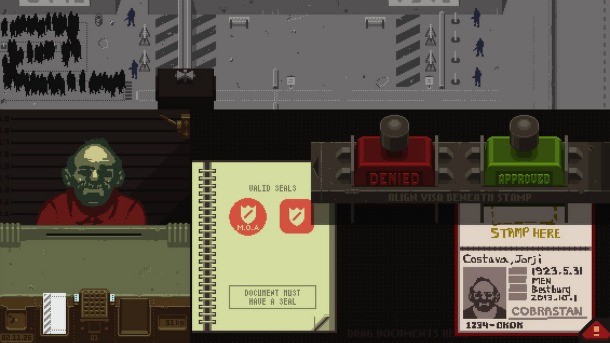
Minority isn’t the only studio focused on bringing forth more meaningful digital experiences. With easier access to the tools and more opportunities to self-publish [see Game Development for Everyone sidebar below], people are using games to open up about a variety of topics. If they don’t see a game that speaks to them, they can craft it. That’s what drove David Gallant to make I Get This Call Every Day, a game that showcased his struggles working customer service at Canada Revenue Agency.
“I Get This Call Every Day was the first project where I felt I had something that I really needed to express,” he says. “The thing about the particular job that I had…the frustration was in the doing and the listening. You don’t necessarily get that if you’re just going through a linear narrative.”
For Gallant, the video game medium allowed people to discover the choices he had whenever someone called, something he felt was key to make players understand his position. “Participating in the act of choosing what questions to ask the caller I felt was [important] because I wanted to show just how many options I had. Every time I got a call, I could get angry, I could break the rules, I could do any number of things that I felt might have been better than trying to do my job, but those also had consequences. You can’t see those consequences without the actual ability to [make the choice].”
Will O’Neill took on even more complex subject matter in his autobiographical game, Actual Sunlight, where players confront suicidal feelings. “It’s a game that I wrote about myself because I didn’t think the story of me, if it was depicted in a more traditional entertainment space, would have been done accurately,” he says. “It’s something I wanted to do for the sake of saying, ‘This is what it’s like to be a person like this,’ and hopefully make a mark and maybe connect with other people who felt the same way who wouldn’t have seen themselves or that experience represented either.”
O’Neill used the game format to showcase his main character’s deteriorating mind state. “The other reason to put it in that format opposed to putting it just in a book is that it really allowed me to experiment with that feeling of declining agency over the character,” he says. While Actual Sunlight is highly linear, O’Neill steadily took control away from the player as the main character got more dejected. Finally at the end, complete control is taken away and you’re forced to do what Evan wants. “That was a really interesting way of reflecting the myopia and the sort of narrowing perspective he has as time goes on,” O’Neill says. “And you can do that in a game, you can take that agency away from a player in a way that you can’t do in any other medium and that’s what was so powerful about it.”
On the other hand, giving the player a complete sense of agency is equally powerful. Lucas Pope created Papers, Please to show the difficulties of a job like border patrol, where he presented conundrums agents often face. “With a game you can really put someone in someone else’s shoes…even in a first-person shooter, a person is put in the shoes of a marine, killing people,” Pope says. “You can do it with mundane topics like this, too. For me, it ended up being the perfect situation to put somebody in to make them think about something they normally don’t think about.”
Pope’s game resonated for the difficult choices you have to make, like whether or not to let in a fleeing refugee despite grave consequences such as being unable to feed your family. He thinks having it in the video game space really enhanced this struggle. “As far as games…I can make the player make decisions,” Pope says. “I don’t have to lay out a story where the main character makes a decision and it’s what happens. I can make the player go through the emotional journey of making a decision or seeing the result of it, or in the case of Papers, Please, you don’t see the result of a lot of your decisions, so it’s almost like you have to imagine what happens to the people that you deny or approve.”
| Game Development For Everyone |
|
These days it’s easier than ever for creators to experiment thanks to low-cost tools like Unity, RPG Maker, and Twine. With digital distribution platforms like Steam, which don’t require developers to partner with publishers, indie games can now reach more people as well. In fact, recently both I Get This Call Every Day and Actual Sunlight were brought to Steam via Steam Greenlight. Video game researcher Kim Shashoua, who hosted a panel at this year’s Game Developers Conference about narratives as therapy, agrees the easy access to these tools and blossoming independent developers have made more of these games catch on. “I actually see the emergence of these types of games not as something that’s totally new, but a logical extension of the advances in technology,” she says. “Before, to make a game you would need hundreds of people behind you at least and all of this corporate support, and because this was such a huge investment, you really wanted to play it safe. Just from that dynamic, you would get games that you were like, ‘Okay, yes, this thing is popular, this is fun – I think a lot of people would buy it.’ That kind of economic pressure would be really limiting." These days you don't need large development teams to be successful; Shashoua notes, games like Papers, Please and I Get This Call Every Day were only made by one person. "I see this as the economic freedom, the big technological equalizer where now individuals can make these games that they weren’t able to distribute as widely," she says. David Gallant, creator of I Get This Call Every Day, agrees. “I definitely think there’s a combination of the democratization of game tools, like Twine and to a lesser extent RPG Maker and Unity, stuff like that becoming more accessible,” he says. “Not just for hobby projects, but for creating actual commercial, sellable games. That’s sort of allowing people to express more personal stories with their work.” |
Up next: Sharing love and illness...
Through The Player's Eyes
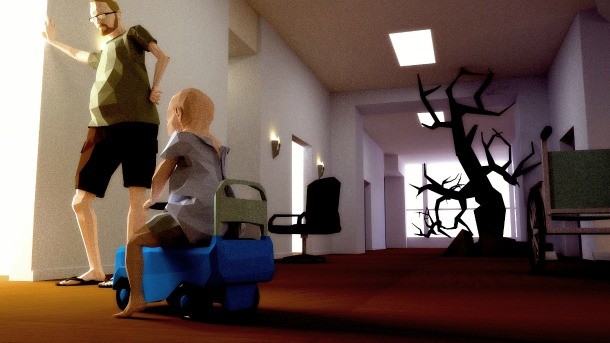
Games occasionally tackle complex topics, but That Dragon, Cancer brings a whole new experience to players. The unpredictability and harsh trials of cancer aren’t exactly something you’d expect to see in a video game, but the Green family wanted to create the game as they faced their young son Joel’s struggle with the illness. The Greens, along with a small group of developers, have been working on the game to convey the experience, not only as a way to cope, but also to share with others the experience of going through the harrowing process. “Cancer has consumed our life for more than four years,” says Ryan Green, Joel’s father. “I can’t help but create out of that place. It’s what I do. It’s what Amy [my wife] does. We create. There wasn’t really a decision on whether or not to share our struggles, but more how best to do it.”
That Dragon, Cancer puts you in the midst of their lives, playing with Joel, learning about his journey, and seeing cancer up close. “We want the player to walk alongside The Greens and share in their journey,” says That Dragon, Cancer co-creator Josh Larson. “One of the ways we’re trying to accomplish this sense is through immersion. This video game is about sharing events that have already happened, so giving the player agency over those events would distract from what we’re trying to accomplish. Instead, the agency we are enabling is related to how those events are explored, observed, interpreted, and received.”
Unfortunately, during development, Joel passed away due to the illness at age five. “Our design direction has changed a few times throughout the process,” Green says. “Early on, it was important to me that the players see just how much Joel had overcome in his sickness. Just how many times he’d received chemotherapy. Just how many times he’d undergone radiation therapy. Just how many tumors he’d beaten. We wanted people to understand all that he’d faced and yet was still here. Since his death, I’ve noticed that it doesn’t ultimately matter. What I’m finding is that rather than retelling the story of his cancer, I want to share what it was like to love Joel in the midst of his illness. More than retelling the story, I want to retell the emotion.”
What’s telling is that while the game hasn’t released yet, players have already felt a connection with Joel by merely hearing about the project, letting his memory live on. The response has been more than those working on the game expected. Larson recalls one lady who walked up to their South by Southwest booth who said,“[That Dragon, Cancer] looks like my world. Nothing else in this room looks like my world.”
But was there doubt that this might be too much, that players wouldn't be willing to confront something so real and sad? Larson thinks the video game space makes players more willing to go on that journey. “Games can create a safe space for players, and that is exactly where we want our players to dwell,” he says. “In the same way players have faith in other designers to challenge their reflexes or their strategic thinking, we hope players have faith in us as designers to challenge their emotional resolve, their ability to love, and their ability to be graceful to others.”
Up next: Exploring the future...
Trending Toward Empathy
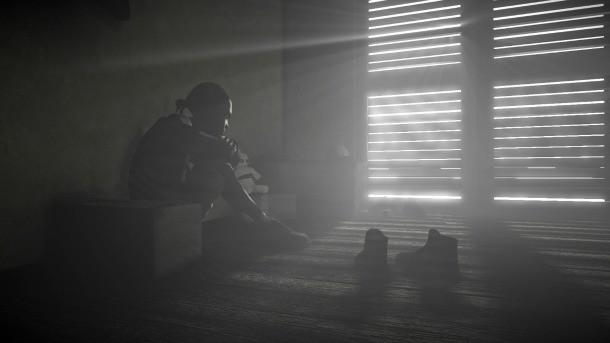
The games industry is evolving, and more people are experimenting with ways to tell their stories within its unique, interactive parameters. Most people making games now grew up with them and they’re simply part of their self-expression. Caballero says this is only the beginning. “The next five years are going to be really fruitful because the dam has been broken and more people are going to want to create and create amazing journeys.”
Games have evolved so much, but the medium is still in its infancy. In just 40 years we’ve gone from two ping-pong paddles to games with full-blown storytelling and vast worlds. Not only is what developers can do with games changing and expanding, but the people who’ve been playing them all these years are maturing as well.
This is part of why Pope thinks we’re ready for these deeper experiences and sees the shift towards these types of games as just a natural outgrowth of maturing games. He uses himself as an example of someone who played games his whole life, and thinks video games are such a large part of this generation. “It’s a common way to experience things and naturally it’s evolved past the idea that it has to be a game where you jump on heads and save the Mushroom Kingdom,” he says. “I think we expect more and we’re more open to different kinds of games, so it’s just natural that we get games that...have deeper messages that people are using to express something about their life.”
The big publishers will continue to deliver triple-A titles, but the evolving medium will continue to become more inclusive of different experiences and people. Games that are just about fun like Mario aren’t going to be displaced by these types of games. When we sit down to play, we often want different things – which is why we have so many different options for not only games, but their respective genres. O’Neill agrees, and thinks games that tackle real subject matter have their own place in the industry. “We’re going to have art-house stuff,” he says. “We’re going to have stuff that is not hugely possessed of a commercial potential, but which will have small groups of people that are passionately devoted to it. I think you’re going to see more and more growth of that kind of scene…we’re not going to ding into Grand Theft Auto V or Call of Duty. It’s going to be two separate things. I don’t think that the two are against each other.”
| The Trend Continues: War as a Survivor |
|
For years, games have explored the topic of war, but This War of Mine is set to shake things up. You’re placed in the role of a civilian as war breaks out and must survive by scavenging supplies, maintaining shelter, and finding food. The studios knows this game is different than anything they’ve done before. “With this one we’re creating something we really believe is art,” says senior writer Pawel Miechowski. “It’s something more than entertainment. A regular game is supposed to deliver entertainment and fun, but with this one we’re delivering a message.” The message won’t be spoon fed to you with heavy dialogue; instead, 11 Bit Studios wants to take advantage of a video game platform. “The experience itself is the message, because it’s going to be your experience,” Miechowski says. “So, you’re going to look at yourself and how you behave when the war breaks out. It’s going to be you making good or bad moral decisions.” Miechowski believes the format works by letting people experience the situation at hand. “Games are perfect to talk about important things because you’re going to be in the middle of the experience…you’re [not] a spectator,” he says. “If someone stops and thinks after playing This War of Mine, that would be really great for us as creators of the message.” |
Questions For The Future
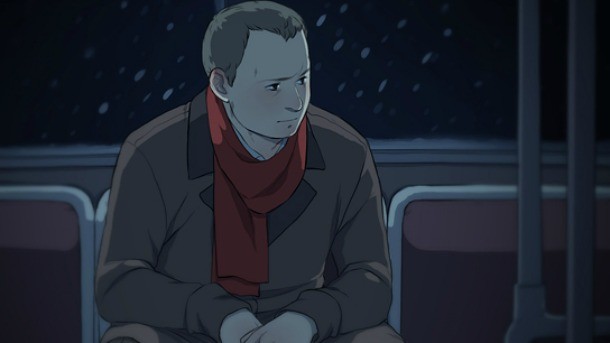
The burgeoning scene of games that tackle real-world issues is a positive development, but can they actually teach empathy? After all, there has to be a reason so many people are referring to them as “empathy games.” However, the research isn’t there yet and empathy is difficult to gauge, so it’s hard to know exactly what these games are causing. “It’s great to set empathy as a goal, but we do have to be wary of claims for empathy,” says Mary Flanagan, director of Tiltfactor Lab, a serious game research center at Dart mouth College. “Because a game that claims empathy, if it’s not tested and evidence is not gathered, can easily be some kind of other relationship…We do have to be careful about what we’re claiming our games do because most of the time we don’t really know.”
But feeling empathy from a game isn’t completely off the table. Flanagan says some studies in other media might be applicable to games. “There’s some great evidence about fiction and being able to lose yourself in fiction and possibly being able to really get into the mindset of someone else in terms of an empathetic situation,” she says. Flanagan spoke about movies that let you take on first- person points of view in narratives that “increases this idea of experience taking” and “can lead to notions of empathy.” Unfortunately, this has yet to be evaluated with video games. “We don’t have great studies about empathy in games,” Flanagan says. “Part of it is that it’s very difficult to measure, and we don’t have a lot of experimental research in games in general.”
Flanagan hopes that we see more research emerge on if these games are actually promoting pro-social behavior. “We know very little about what games are doing [or] how we can use them well,” she says. “We know them as an art form. We know when people are moved. We know when people are horrified. But I don’t think we know very much about what games are doing and what their potential is, and that’s why it’s an interesting field right now. It really is a frontier, and I hope we have rigorous researchers who can come along and let us know and some of this stuff may be stuff we don’t want to hear.”
Art often imitates life, and we often create what we know. Video games are no exception. Hopefully, these types of games will grow past the arbitrary title of “empathy game,” and just be accepted as another type of genre like drama movies or autobiographical books. Time will tell where it leads, but it’s hard to deny this is an interesting new direction that’s only bound to build more momentum.








